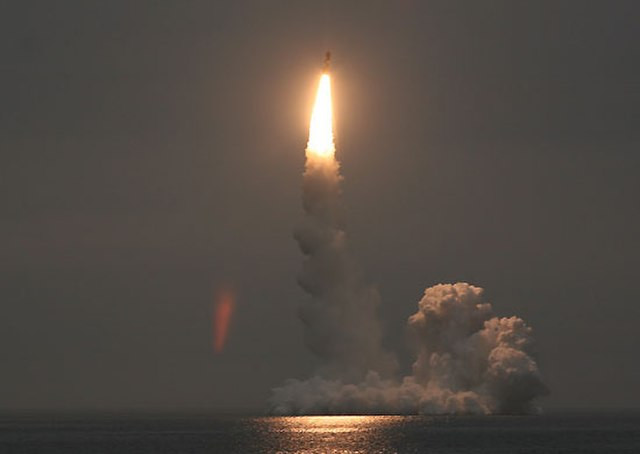Russia's maritime military prowess was on display as the country's defense ministry announced the successful test launch of a Bulava intercontinental ballistic missile from the new Borei-class nuclear-powered submarine, Emperor Alexander III. This strategic move comes amidst escalating tensions with the West and marks a significant milestone in Russia's naval capabilities.
The Bulava missile, a 12-meter-long behemoth with a potential 8,000-kilometer range capable of delivering multiple nuclear warheads, was fired from an underwater position in the frigid waters of the White Sea and precisely struck a designated target on the Kamchatka peninsula. This exercise serves as the ultimate trial run before the formidable Emperor Alexander III joins the Russian Navy's active fleet.
Notably, the Emperor Alexander III is the latest addition to Russia's Borei-class submarines, which stand out for their enhanced maneuverability and discretion compared to their predecessors. Moscow plans to construct a total of 10 to 12 such vessels, with the aim of deploying them between the Northern and Pacific fleets.
President Vladimir Putin's decision to test such significant nuclear capabilities is indicative of his agenda since taking power in 1999, which has been characterized by a substantial increase in military spending and a drive to refurbish the nation's nuclear and conventional arsenal.
This recent demonstration of nuclear might follows closely on the heels of Putin's suspension of Russia's participation in the Comprehensive Nuclear Test Ban Treaty and the New START treaty, although the Kremlin asserts it will still adhere to the set limits on nuclear armaments. The timing of the test, just after Putin's ambiguous remarks about resuming nuclear testing, seems to send a stark message amidst deteriorating relations with the West, exacerbated by the ongoing conflict in Ukraine.
Kremlin spokesperson Dmitry Peskov emphasized the gravity of the current diplomatic rift with the United States, stating in a broadcast interview that bilateral relations were "at zero-or I would say below zero." Despite this frosty climate, Peskov hinted at the inevitability of future dialogue, noting that "at some point, the leaders of Russia and the United States would have to resume contact," and reaffirmed Putin's openness to discussions.





